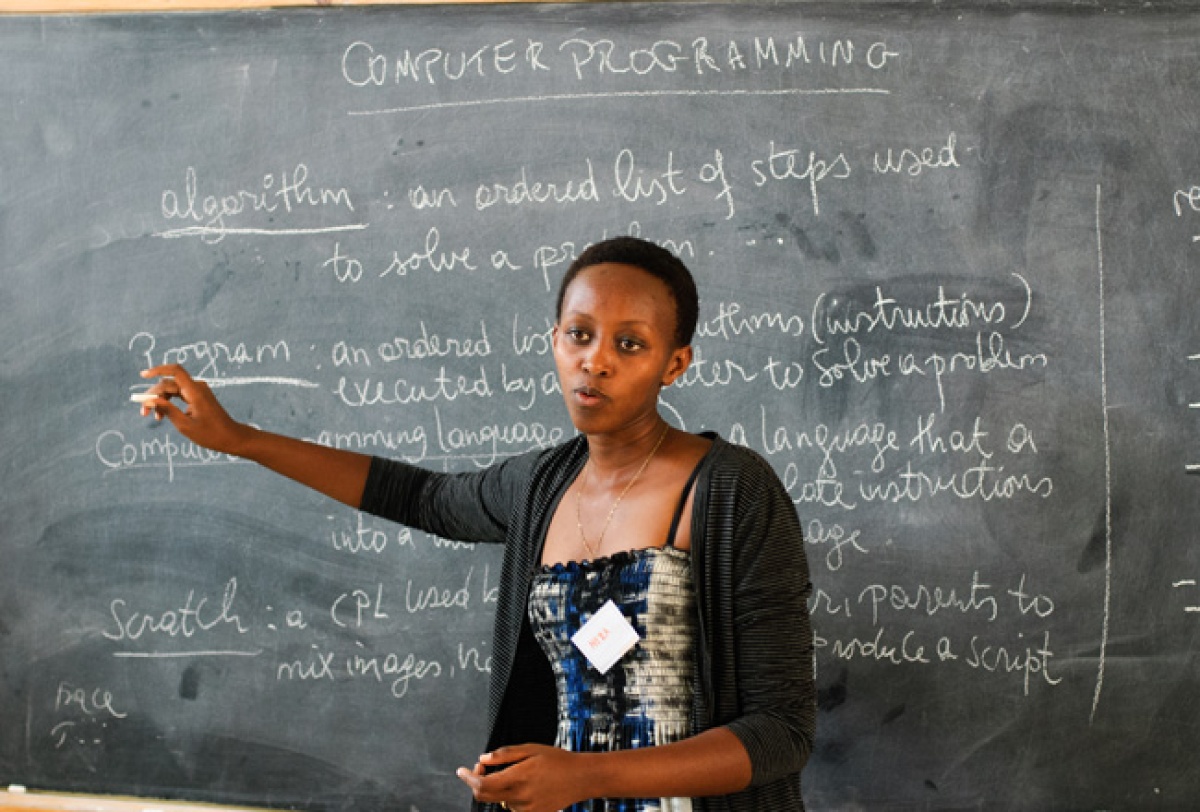Algorithms, Spreadsheets, and Gender Equity in Rwanda
Posted on Sep 12, 2013

Neza Guillaine had a seemingly simple task for the 16 young women who sat in front of her in a small classroom in Gashora, Rwanda: Provide step-by-step instructions for drawing a smiley face on the chalkboard. But there was a catch. “They should very literally follow the steps in such a way that any impreciseness, such as a student telling me to draw a circle without first telling me to pick up the chalk, causes problems,” Guillaine says.
Guillaine, 26, is a Java developer for PIH’s Rwanda sister organization Inshuti Mu Buzima. She spends her days tackling tech issues, designing new features for PIH’s open-source electronic medical record system, and helping improve the documentation process for clinical teams. It’s been a challenging career path to pursue. From Silicon Valley to Shanghai to South Africa, the gender gap in science, technology, and engineering is enormous. And in settings such as Rwanda, where access to computers is limited and cultural barriers plenty, it’s exceedingly difficult for women to get a foothold in the field.
“There are many challenges for women in science and technology. Some girls just think they can’t make it or that the technology world is only meant for men. Some girls don’t get enough support from their families at a young age,” Guillaine says. “I knew what I wanted to do and started work early on at university so that when I finished I had knowledge that could help me get a small internship.”
Guillaine has always been keen on sharing tips with women interested in pursuing a career in tech, so she was excited when presented with the opportunity to lead three seminars for the weeklong Camp TechKobwa at the Gashora Girls Academy of Science and Technology. Organized by three groups—Peace Corps, Girls in ICT Rwanda, and kLAB—Camp TechKobwa hosted 48 female students from a handful of nearby high schools, who were introduced to a variety of tech issues. Students learned how to set up an email account, the basics of blogging, and the fundamentals of programming. Over the week, advice on personal health and financial planning were weaved into the seminars.
For her lessons, Guillaine decided to introduce students to Scratch, an educational programming language and multimedia authoring tool created by the Massachusetts Institute of Technology that teaches the basics of designing an algorithm. “The objective of this lesson was to equip students with programming skills by explaining to them what an algorithm is (a set ordered list of steps used to solve a problem) in a real life situation,” she says.
That’s where the smiley face came in. By making sure the students listed every step Guillaine had to take—from picking up the chalk to drawing the actual smile—they came to understand how algorithms make up a program and how programs execute larger-scale tasks. Once the basics were mastered, students began looking for ways to incorporate Scratch into their daily lives and peppered Guillaine with questions on additional programs.
And Guillaine wasn’t the only PIHer leading seminars at the camp. Marie Paul Nisingizwe, a data analyst with PIH/IMB, taught classes on how to use Microsoft Excel. Nisingizwe is well aware of the challenges women face as they pursue careers in science and technology. When she started studying statistics at the Kigali Institute of Science and Technology in 2009, she was one of only two women in her class. The situation compelled her to start volunteering with nearby high school girls, with a focus on building their confidence and instilling the notion “to be confident that they can do anything.”
As the Camp TechKobwa week went on, both Guillaine and Nisingizwe stepped back from the nitty-gritty details of spreadsheets and algorithms and gave broader advice on career development.
One suggestion Guillaine isn’t shy about sharing: “When you are a girl, sometimes you might need to work even harder to prove you can make it.”
Across the world, PIH employees like Guillaine and Nisingizwe continue to break down antiquated barriers and usher in a new era of gender equity.

